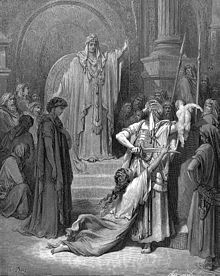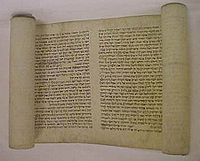Bible: What Does Proverbs 29-31 Teach Us About Child Discipline and the "Wife of Valor"?
Solomon

Child Discipline
Do you practice corporal child discipline?
Proverbs 29-31: Child Discipline; The Right Kind of Leader; Differences Between Righteous and Wicked; God's Word and Human Speech; The "Wife of Valor"
Proper Child Discipline
Stubbornly refuse correction, and you will suffer sudden and irremediable destruction (v. 1).
If parents discipline their child early in life, not permitting him to have freedom without due responsibility, they will produce a wise, not a shameful, son (v. 15), and bring themselves rest and delight (v. 17; cf. v. 3).
Verse 19 suggests that servants should receive physically administered correction if they do not respond properly to the verbal variety.
Choose the Right Kind of Leader
Solomon recognizes the importance of choosing the right kind of leader for the people's sake (v. 2).
This man must administer and seek to establish justice for their welfare, and be honest in his associations (v. 4).
Since followers rise in moral stature only as high as their mentors, in government as elsewhere, it is incumbent upon leaders to reject falsehoods (v. 12).
The leader must deal truly with the poor; if he does, he will garner re-election (v. 14).
[How should leaders deal truly with them?
Keep them on the public dole, or make it possible for them to better themselves by gradually leading them away from the trough?
“Workfare” rather than welfare?]
How and when you speak and react to circumstances manifest wisdom or the lack thereof. Both the flatterer and the neighbor who believes his words behave foolishly (v. 5).
Regardless of a fool's emotional reaction to a wise man’s counsel or correction, discord results (v. 9).
The ability to keep your intense emotions under control is a sign of wisdom; blowing your top signifies folly (v. 11).
If you habitually share your opinions on matters too quickly—that is, you activate your mouth before you engage your mind—you are, in one sense, like one who is wise in his own eyes (v. 20; cf. 26:12).
Differences Between the Righteous and the Wicked
Solomon also specifically discusses the differences between the righteous and the wicked in several places. Snares entangle the wicked in his sin, but the just rejoice (v. 6).
[Is this verse saying that the righteous rejoices because the wicked one is caught, or that he sings for joy because he avoids the snare of transgression?]
Verse 7 shows the compassion of the righteous for the poor; the wicked does not even know what concerns the poor have. Hatred for the innocent characterizes the wicked, while the righteous seeks the nephesh of the one under attack (v. 10).
Though evil and evildoers increase, the saints will one day witness God's victory over them (v. 16).
The righteous hates the lifestyle of the wicked, and vice versa (v. 27).
Finally, divine word and action interact with human actions to teach valuable lessons. Immorality reigns where what God says is ignored or is absent (v. 18).
The LORD protects those who fear Him and who do not fear what man may say or do to them (v. 25b; cf. Mt. 10:28).
Yahweh brings forth justice to those who seek Him (v. 26b).
The Word of God

Wisdom
view quiz statisticsProverbs 30
Verse one indicates that a change in writer has occurred; Agur now addresses Ithiel and Ucal.
He begins with some self-deprecating remarks—exaggerations that people often use when they realize how little they truly comprehend God's ways (vv. 2-3).
His five rhetorical questions challenge his hearers to search beyond the simplistic answers to explain further who the LORD and His Son are (v. 4).
Do Not Misrepresent God's Word
Turning to a discussion of the word of God and human speech, Agur warns against supplementing what God has said with faulty human reasoning.
In essence, what he says amounts to "If you trust Him, He will protect you; if you contradict or misrepresent His word, He will avenge Himself" (vv. 5-6).
The speaker himself may have been aware of those who tended toward wrong speech, for he prays for deliverance from this malady (vv. 7-8a).
Agur also asks God to meet his needs adequately so that he might avoid denying Him (because, as a rich man, he believes that he does not need Him) or profaning Him (because, as a poor man, he needs to steal in order to survive) [v. 9].
Evil speech must not occur either in the workplace or in the family (vv. 10-11).
An Evil Generation's Character Revealed
Agur makes four observations about an evil generation's general characteristics (vv. 11-14): It
(1) hates parents (v. 11),
(2) is self-righteous and self-deceived (v. 12),
(3) exhibits arrogant pride (v. 13) and
(4) is greedy (v. 14).
Later, he graphically portrays the ignominious end of those who practice the first (v. 17).
Next, the author employs a formulaic expression—"There are three things . . . four which . . . "—five times for different purposes.
The first set (vv. 15-16) lists four things that are never satisfied:
(1) Sheol: no one escapes the grave;
(2) The barren womb: it will never bear a child;
(3) The desert: it will lack water; and
(4) Fire: its hunger never ceases.
Agur demonstrates in the second set (vv. 18-19) his ignorance about the ways of nature and mankind.
However, he does appear to understand the way of the adulterous (v. 20).
[The adulteress has no sense of guilt about her lifestyle.]
Set #3 describes four perturbing circumstances (vv. 21-23):
(1) A slave-king would possibly be incompetent,
(2) A "full" fool would probably sleep,
(3) A wife who hates would cause discord, and
(4) A slave-girl-turned-mistress would possibly succumb to power.
The fourth set (vv. 24-28) manifests Agur's perceptiveness regarding nature and animal instinct.
He notices that God has granted a special survival wisdom and "dignity" to the smallest and most insignificant animals.
Fifth, the speaker focuses on the majesty of some animals and of a human king, as they strut about in their particular domains (vv. 29-31).
Agur concludes his wise sayings by issuing a warning against the foolishness of self-exaltation (vv. 32-33).
He advises silence and self-restraint instead.
[Conjecture: Could Agur simply be a pseudonym for Solomon?]
Proverbs 31
The chapter's introduction assigns authorship to a King Lemuel, who, some say, was Solomon (v. 1).
Lemuel's mother actually speaks here, warning her son about the destructive influence of women (vv. 2-3).
[Perhaps she meant foreign women with whom her son had had unrighteous and ungodly relationships].
Avoid Alcoholic Beverages
Then she advises him on the improper and acceptable use of strong drink (vv. 4-7).
Kings should not drink alcoholic beverages because liquor both diminishes and ruins moral judgment (vv. 4-5).
On the other hand, physicians should administer these intoxicants to sufferers, because the spirits induce forgetfulness and dull their pain (vv. 6-7).
With her final exhortation, she directs her son to be an advocate for the speechless, the condemned, and the poor (vv. 8-9).
The Wife of Valor

John MacArthur
The "Wife of Valor"
Verses 10-31 concern themselves with the numerous admirable qualities of “the wife of valor.”
[These verses appear as an alphabetical acrostic in the Hebrew Bible. Cf. Ps. 119].
Lemuel's initial question suggests that such a woman is rare and of great value (v. 10).
A wife of valor:
(1) is trustworthy and always good to her husband (vv. 11-12),
(2) is gifted at making clothes for herself, for her family, and for others (vv. 13, 19, 21-22, 24),
(3) shops for food and diligently prepares it (vv. 14-15),
(4) has good common sense regarding finances and investments (v. 16),
(5) is not physically weak (v. 17),
(6) knows and seeks quality products (v. 18),
(7) is compassionate toward the poor (v. 20),
(8) is a credit to her husband (v. 23),
(9) provides extra income for her family by her efforts (v. 24),
(10) is strong spiritually and wise, and speaks kind words (vv. 25-26),
(11) works hard in guiding her children and operating her house (v. 27), and
(12) is the object of family and community praise, because she fears God and does good works continually (vv. 28-31).
Summary Questions
1. What is the "beginning of wisdom?"
2. Does following Solomon's advice exactly always result in success? Why or why not?
3. What parts of man that Solomon stresses require special diligence?
4. What two ways does Solomon continually contrast?
5. What is so valuable about knowing that God is sovereign?
6. Why is learning to listen so vital to proper communication?
7. Is there any hope for the fool? The simple? If it exists, what is it?
8. What is Solomon's position on poverty?
9. According to Proverbs, what are some characteristics of friends?
10. Why is it better to think of Wisdom as a divine quality rather than a divine Person?
11. Whom does Solomon address in several of his chapters?
12. What is Solomon’s position on alcoholic beverages?
© 2013 glynch1






